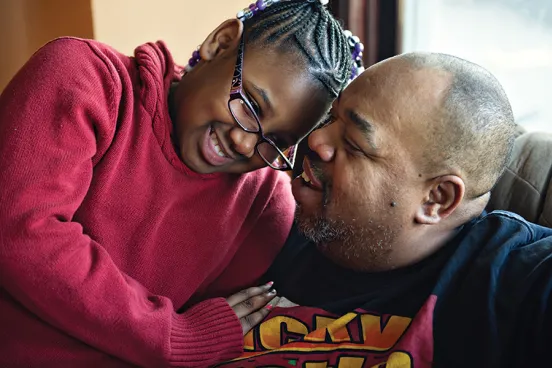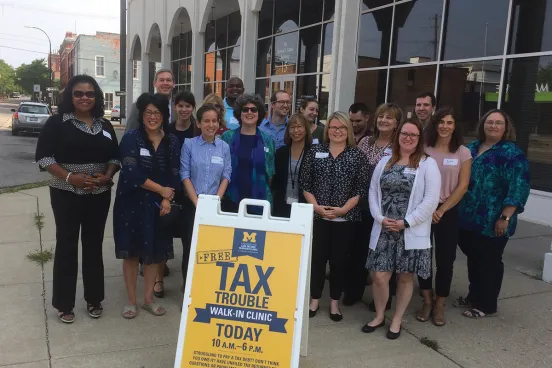
As the director of the Low Income Taxpayer Clinic (LITC), Professor Nicole Appleberry, ’94, sees firsthand how tax issues affect domestic violence survivors.
Take client Jane Doe, a mother of four who works as a waitress. She is legally entitled to claim her children as dependents on her tax return, but her ex-husband, who lives in another country and does not have the legal right to claim them, did so first, preventing Doe from receiving the tax refund she desperately needed. More than a year later, the LITC is still working with the IRS to prove that its client is entitled to claim her children as dependents.
Doe’s situation is just one example of how batterers try to control their victims financially after they have left the abusive relationship. “Domestic violence is about power and control,” Appleberry says, “and when a woman leaves a domestic violence relationship, she is particularly vulnerable, especially from a financial standpoint. A batterer will exploit her vulnerability, which will come in many different ways, including in the form of tax implications.”
While some batterers, as in Jane Doe’s case, will illegally claim their children as dependents, others might under-report their income on their tax returns, a problem since domestic violence survivors are equally liable for the taxes owed on a joint tax return. Appleberry cited an LITC case in which the client’s estranged husband— unbeknownst to her—had a second job that was used to support a girlfriend in another city. The husband didn’t report those earnings on their tax return, and when the IRS sent letters to both of them about the discrepancy, he hid the client’s mail in the trash, where she later discovered it.
This is an important nuance to the case, Appleberry points out, because individuals have 90 days from the date the IRS sends its Notice of Deficiency (or a Notice of Determination, denying innocent spouse relief) letter to dispute the proposed assessment in tax court.
“When you have that kind of window, it can be very effective for the batterer to deprive the woman of her rights, which may be her last chance to say she shouldn’t have to pay this tax,” Appleberry says. “You can do what’s called an audit reconsideration after the 90 days have passed, where you ask the IRS to take a look at the issue, but there is a big difference between asking the IRS and having the right for a judge to assess the situation. Tax Court is also the only forum where a taxpayer can dispute a liability without having to pay the tax first—so for many low-income people, it is effectively the only judicial forum available.”
The LITC handles approximately 80 cases each year, and tax cases of domestic violence survivors comprise a signifi cant percentage of the clinic’s workload. Some of these cases are referred by Michigan Law’s Pediatric Advocacy Clinic, which handles divorce cases of domestic violence survivors (along with their other matters), and the Family Law Project, a joint program of the Law School and Legal Services of South Central Michigan that focuses on representing low-income domestic violence survivors.
As a rising 2L at Michigan Law, Appleberry held a summer job with the Family Law Project and later took the Child Advocacy Law Clinic; both experiences sparked an interest in working on domestic violence and child abuse cases. After graduation, she worked as an assistant prosecuting attorney in Livingston County, Michigan, for four years, which enabled her “to see from both the criminal and civil perspectives how domestic violence affects people’s lives.”
Appleberry’s work as a prosecutor and as the director of the LITC has motivated her to begin writing an academic paper in which she is proposing the creation of a domestic violence exception to the usual method of determining one’s tax-filing status. In general, the IRS considers one’s marital status on the last day of the tax year (December 31) to be one’s marital status for the entire tax year. While individuals can identify themselves as single if they separated during the first six months of the year, they must identify themselves as married if they separated in the latter half of the year.
“If you are a domestic violence victim and you leave the relationship on December 31, you should be entitled to consider yourself single for the purposes of claiming deductions and credits that are available for low-income people,” Appleberry says. “If I have a domestic violence survivor who left on December 31, could file a tax return on February 1, and two weeks later could get a $2,000 refund check from the IRS, it can make an enormous difference in her ability to survive. But oftentimes she is being precluded because she left in the second half of the year versus the first half of the year, and many deductions and credits require married people to file jointly, which of course could be dangerous for a domestic violence survivor.”
While batterers disempower their victims, Appleberry hopes her work and the attention it will draw will do just the opposite. “If there is anything I can do to make a domestic violence survivor feel and be less vulnerable, I want to be able to do it,” she says.







